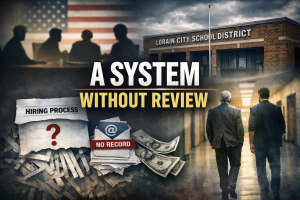$25,000 for Grammarly: What Lorain Needs to Know Before Saying Yes

By Aaron C Knapp LCPU
Aug 11, 2025
The latest “Matters for Discussion” docket shows the Lorain Police Department asking to enter into a $25,000 contract with Grammarly Inc., paid from the Levy Special Revenue Community Service fund. The request sits alongside smaller tech installs and far larger construction items—but this one deserves special scrutiny because it touches police reports, sensitive data, and compliance risk.

Grammarly is a third-party cloud writing tool. It’s excellent at catching typos and tightening sentences. It also, by design, ingests whatever text you feed it so it can analyze and suggest changes. When the writers using it are police officers, that text can include Criminal Justice Information (CJI)—material governed by strict CJIS security controls. In short: better prose is good; accidental data exposure is not.
Thanks for reading Aaron’s Substack! Subscribe for free to receive new posts and support my work.
What, exactly, are we buying?
Before Council approves a $25,000 spend, taxpayers deserve clarity. How many seats are included and for how long? What is the per-user cost, and is there a volume discount? Which edition is on the table—Business or Enterprise—and which features come with it: style guides, tone suggestions, plagiarism checks, or generative AI rewrites? Just as important, where will it live? Is Grammarly destined for every workstation, including CJIS-connected machines, or will it be limited to training laptops and offline drafting stations? Without concrete answers, $25,000 feels like a round number searching for a rationale.
The CJIS and privacy problem in plain English
Any time an outside vendor touches CJI, the rules change. CJIS requires more than a handshake: a specific Security Addendum in the contract, vetted vendor personnel, encryption, access logging, audit rights, retention limits, and firm commitments on where data is stored. Most off-the-shelf SaaS tools aren’t turnkey-CJIS. If Grammarly isn’t operating under a CJIS-conformant agreement and technical configuration, officers cannot paste reports, narratives, identifiers, or investigative details into it. Approving this purchase without clear guardrails risks creating a brand-new pathway for policy violations.
Safer, cheaper steps that make sense right now
Lorain already owns tools that improve writing. The built-in checkers in Microsoft 365 or Google Workspace can handle routine proofreading on CJIS-connected machines when those apps are configured to avoid cloud submission. Training templates and boilerplate can be drafted with Grammarly and then sanitized, while real report narratives stay out of the tool entirely. Most importantly, policy should come before product: publish a one-page SOP that defines what is and isn’t allowed, spells out where Grammarly may be installed, disables model-training features by default, and requires activity logging.
What City Hall should put on the record
City leaders should explain the problem this purchase is meant to solve and how success will be measured. They should state how many seats, which edition, the term length, and the true per-seat cost. They should confirm whether the contract includes a CJIS Security Addendum and audit rights, where Grammarly will store any data and for how long, and whether model training can be disabled and strict retention set to “no keep.” They should also describe which machines will run Grammarly—RMS and CAD endpoints should be out of scope—and point to a written policy that covers any draft that might contain CJI. Finally, they should justify why the money comes from the Levy Special Revenue Community Service fund and what that choice means for other levy-backed needs.
New: What a “safe” rollout would actually look like
If Lorain moves forward, the difference between responsible adoption and a headline-making mistake is discipline. A safe rollout starts with a bright-line promise that no CJI will enter Grammarly under any circumstance unless a CJIS-conformant contract and technical environment exist. That promise only matters if it is visible to officers and enforced on day one. The department should publish a short, plain-language policy that defines CJI in terms officers recognize—names, DOBs, NCIC-derived details, witness statements—and then anchors practice around that definition. The software should be installed only on non-CJIS workstations dedicated to administrative writing, not on RMS or CAD machines, and the tenant should be configured to disable model training and minimize retention. Training should show real screenshots of “do this” and “don’t do this,” emphasizing that even a single pasted paragraph from a live case defeats the purpose of the policy.
A six-month accountability window is the second pillar. If Grammarly is justified as a productivity tool, the department should publicly report what changed. That means identifying how much time was saved on administrative writing, how error rates moved on non-CJI documents, and whether any violations occurred. If the tool never touches live cases, those metrics should be easy to publish without compromising investigations. The city can set the expectation now that, at the end of six months, either the approach proves itself or it sunsets.
If Council presses pause, what should happen instead
There is a straightforward alternative that does not require a $25,000 leap. The city can improve clarity with the software it already owns and a little bit of craft. Microsoft Word’s editor, used locally and configured not to transmit content to the cloud, can catch most of the low-hanging fruit that trips up readability. A short internal style guide can align common phrasing so similar incidents read similarly, which helps supervisors and prosecutors just as much as it helps the public. Targeted training on report structure—what facts belong where, how to avoid ambiguity, how to write chronologies—will do more for credibility than any algorithm. If leadership still wants an AI-assisted solution for narratives, the honest next step is to evaluate tools designed for criminal justice environments rather than forcing CJI through a general consumer cloud.
Bottom line
Clear writing matters in policing. But clarity can’t come at the expense of compliance and confidentiality—and it shouldn’t cost $25,000 without a transparent plan, strict limits, and measurable outcomes. If Council approves this purchase, pair it with a published SOP, a narrow footprint that keeps CJI out of the cloud, and a six-month report-back showing precisely what taxpayers received beyond nicer commas. If Council presses pause, use the time to do the simple things that work: local tools, a real style guide, and training that treats report writing as a core skill rather than an afterthought.






